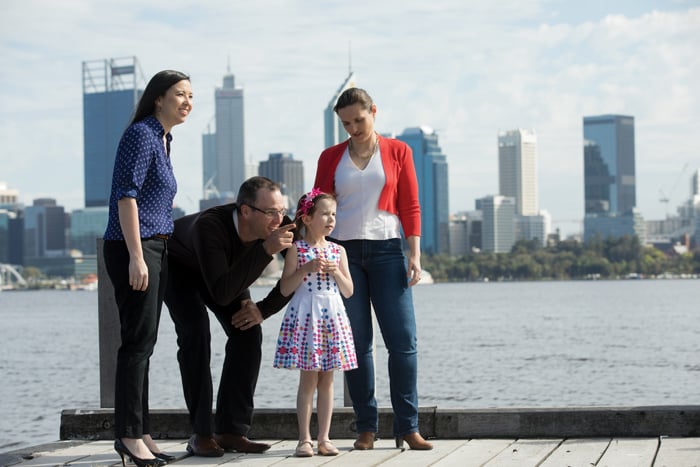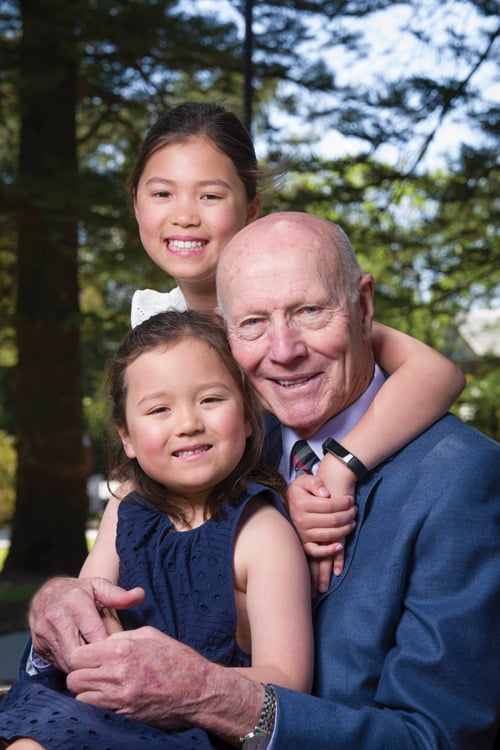
Brain tumour researcher Dr Raelene Endersby and Matt, Abby and Victoria Fitzgerald are
working together to help find a cure and better treatments for childhood cancer
Matt Fitzgerald reels off the ongoing effects from his daughter Abigail’s battle with medulloblastoma and regrettably, they don’t fit on one hand. Diagnosed with brain cancer at four, Abby is now eight and officially in remission. But the effects from her 31 daily doses of radiation and full year of chemotherapy have made their mark.
“She has a daily injection of growth hormone – her pituitary gland was shrivelled by the radiation, so without a daily injection she won’t grow – and she has some lung damage that presents like asthma,” Matt explains. “She has difficulty with her short-term memory and is developmentally behind, and she has to do some special movement programs. She’s had some eye damage too – one of her eyes turned in after surgery so she had double vision. In fact, she nearly lost one of her eyes during treatment due to an infection.” But, he says, “She’s here, and she’s relatively healthy and happy, and we’re so grateful.”
Matt, wife Victoria and big brother James were leading a fairly normal, uneventful life until Abby started an odd daily regimen of random vomiting, particularly in the morning. “It was just after winter and there were a lot of bugs around so we assumed it was that,” Matt explains. “But we watched it happen for a couple of weeks and finally our GP said, ‘look, it’s a bit strange. Why don’t you go to PMH and make sure everything is OK?’ He told us not to worry and assured us that it would be something explainable.”
A few days later, Abby was on the operating table as a surgeon worked to remove the tumour between her brain and spine over eight nail-biting hours. Then began her daily radiation treatment, which was performed under general anaesthetic (GA) due to her age. “She’s had 44 GAs at last count – that’s more than our family has had altogether in about 15 generations,” Matt says wryly. By the time she was six, and halfway through her chemo schedule, “Abby got down to 11kg. There was literally nothing to her but skeleton and a head.”
Matt says he and Victoria felt utterly helpless. “One, you don’t know much about it. It’s this huge killer of children yet we hadn’t given brain cancer a second thought,” he says.
“The oncology ward of a children’s hospital is not somewhere where you want to holiday. It’s such a stressful time – we got through it, but it causes a lot of divorces because the pressure is incredible. You run on adrenaline and it’s incredibly draining when it comes out of your system. You have to have huge trust in the doctors and nurses. It’s not easy to hand your child over to them for eight hours of surgery or to pump something into their bodies.”
Matt says that while they felt like screaming from the hilltops about their situation, he and Victoria’s overriding instinct was to fight. “We couldn’t go and get a medical degree and try and solve it ourselves but we can put in effort and money towards fundraising for research going on. We wanted to be part of the solution, rather than the problem. And that’s how we got involved with The Adventurers.”

It’s a story Geoff Cattach understands well. Thirty seven years ago, his son Brent was diagnosed with acute lymphoblastic leukaemia just shy of his third birthday. Back then the survival rates were dismal with more than 70 percent succumbing to the disease. Then the unthinkable happened – his other son, Stewart, was diagnosed with a brain tumour at 13 while his little brother was still fighting for survival. It was, says Geoff simply, a “pretty awful” time. Like Matt, he felt utterly helpless watching his two beloved boys stricken with cancer.
Then the fight kicked in. An AMP financial planner, Geoff had plenty of contacts, and when he joined forces with Peter Harper at the Children’s Leukaemia and Cancer Research Foundation (CLCRF), the fundraising went up to a whole other level. A year later, Geoff took over as Chairman and within two years, the group had raised $100,000 and recruited Professor Ursula Kees, a renowned cancer researcher from Switzerland.
Since 1979, CLCRF has raised more than $31 million for the Institute’s cancer research and the survival rates for childhood leukaemia have risen from 30 to more than 80 percent. Research from the Institute’s Cancer Centre has contributed to this progress.
Meanwhile, The Adventurers – of which Matt is now Chairman – has raised nearly $10 million to help fund the Brain Tumour Research Laboratory within the Cancer Centre over the past seven years.
“Literally, the Brain Tumour Research Lab would not exist without this type of philanthropic help,” Dr Nick Gottardo, Co- Head of the Institute’s Brain Tumour Research Team, says.
Nick continues: “Their generous support allows us to get on with the important work of testing new drugs and developing new therapies for kids suffering with brain cancer as the current most effective treatment option, radiation, can be very damaging, especially to young children whose brains are still developing. Ultimately, we want to reduce our reliance on radiation by finding more effective treatments to improve survival rates as well as the quality of life of our patients.”
Matt hopes they can emulate in the Brain Tumour Research Lab the kind of results that leukaemia has had. “Everyone is realistic in there – we want these kids to not pass away for a start but it’s also about research that creates better treatments,” he says. “Radiation is so effective because it will kill almost everything but so damaging at the same time. We need a better answer.”
Matt and Geoff are two shining examples of how two parents, in the worst moments of their lives, can dig deep and make a huge difference to the outcome of children diagnosed with cancer now and in the future. Thankfully, Brent Cattach survived leukaemia after a bone marrow transplant in 1984, Stewart Cattach survived both his initial tumour and a second one discovered when he was 31, and Abby Fitzgerald is back at school full-time and continuing to do well.
“In many ways all this energy we put into fundraising doesn’t do much for our daughter,” Matt says. “But as a family having come through this, we just can’t pull ourselves away from the horror of it. That’s the burden of it, but we wouldn’t change it. We want that cure for other children like Abby.”
Want to help The Kids create a healthier future for children? People like you make all the difference. Join us by making a donation, fundraising, becoming a corporate sponsor, or making a bequest.
